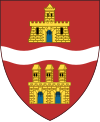Portal:European Union
Introduction
The European Union (EU) is a supranational political and economic union of 27 member states that are located primarily in Europe. The Union has a total area of 4,233,255 km2 (1,634,469 sq mi) and an estimated total population of over 449 million. The EU has often been described as a sui generis political entity combining the characteristics of both a federation and a confederation. Containing 5.8% of the world population in 2020, EU member states generated a nominal gross domestic product (GDP) of around US$16.6 trillion in 2022, constituting approximately one sixth of global nominal GDP. Additionally, all EU states except Bulgaria have a very high Human Development Index according to the United Nations Development Programme. Its cornerstone, the Customs Union, paved the way to establishing an internal single market based on standardised legal framework and legislation that applies in all member states in those matters, and only those matters, where the states have agreed to act as one. EU policies aim to ensure the free movement of people, goods, services and capital within the internal market; enact legislation in justice and home affairs; and maintain common policies on trade, agriculture, fisheries and regional development. Passport controls have been abolished for travel within the Schengen Area. The eurozone is a group composed of the 20 EU member states that have fully implemented the economic and monetary union and use the euro currency. Through the Common Foreign and Security Policy, the union has developed a role in external relations and defence. It maintains permanent diplomatic missions throughout the world and represents itself at the United Nations, the World Trade Organization, the G7 and the G20. Due to its global influence, the European Union has been described by some scholars as an emerging superpower. In 2012, the EU was awarded the Nobel Peace Prize. The United Kingdom became the only member state to leave the EU, in 2020; ten countries are aspiring or negotiating to join it. (Full article...) Selected article€2 commemorative coins are special euro coins minted and issued by member states of the Eurozone since 2004 as legal tender. The coins typically commemorate the anniversaries of historical events or draw attention to current events of special importance. Eighteen variations of €2 commemorative coins have been minted. €2 commemorative coins have become collectibles. The basis for the commemorative coins derived from a decision of the European Council, which repealed the prohibition of changing the national obverse sides of euro coins from 1 January 2004 onwards. The face value of the coins, typically is less than their intrinsic value of between €3 and €12. The exceptions are San Marino and the Vatican City, where coins from the former are regularly sold for between €30 and €40, while coins from the latter are very rarely obtained for less than €100. Issued designs are made public in the Official Journal of the European Union. Selected picturePhoto credit: Massimo Catarinella The Keizersgracht ("Emperor's Canal" in Dutch), the widest of the three major canals of Amsterdam, at dusk. Located in the city centre, it is named after Maximilian I, Holy Roman Emperor. The more than one hundred kilometers of canals in Amsterdam, about 90 islands and 1,500 bridges have led the city to being termed the "Venice of the North".
Did you know?...that within the Eurozone the European Central Bank has the exclusive authority to set monetary policy? ...that Greenland and United Kingdom are the only countries to ever leave the European Union? Selected cityBudapest is the capital city of Hungary and the country's principal political, cultural, commercial, industrial and transportation center. Budapest has approximately 1.7 million inhabitants, down from a mid-1980s peak of 2.1 million. Budapest became a single city occupying both banks of the river Danube with the amalgamation on 17 November 1873 of right-bank Buda together with Pest on the left bank. It is the ninth largest city in the European Union. Budapest's recorded history begins with the Roman town of Aquincum, founded around AD 89 on the site of an earlier Celtic settlement near what was to become Óbuda, and from 106 until the end of the 4th century the capital of the province of lower Pannonia. The Hungarians led by Árpád settled in the territory at the end of the 9th century, and a century later officially founded the Kingdom of Hungary. Research places the probable residence of the Árpáds an early place of central power near what became Budapest. The Tatar invasion in the 13th century quickly proved that defence is difficult on a plain. King Béla IV of Hungary therefore ordered the construction of reinforced stone walls around the towns and set his own royal palace on the top of the protecting hills of Buda. In 1361 it became the capital of Hungary. General imagesThe following are images from various European Union-related articles on Wikipedia.
TopicsFeatured contentFeatured articles
Featured lists
Featured contentGood articles
CategoriesRelated portalsAssociated WikimediaThe following Wikimedia Foundation sister projects provide more on this subject:
Discover Wikipedia using portals |
































































